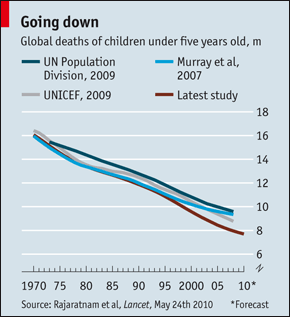
NYT story kills the one "give" I made in my recent WPR column on "deglobalization's" many myths.
My mistake, because if I hadn't been so busy turning 48 (Sniff! My 49-year-old wife just joined AARP, but she's got a MA in elder studies, so I'm calling it a professional quirk) and watching Em graduate from HS (frugal babe, she refused to buy her academic honors and Japanese honors cords), I would have noticed this article just in time for the piece I wrote last Saturday!
In the piece, I admitted that guest worker numbers depressed, and thus so did remittances. Based on this piece though, the former effect was negligible-to-unimportant and the latter? Well, there was less money everywhere for a while, so that says little about "deglobalization" and simply says it was a financial crisis on a global scale (Boo hoo! No repeal of the biz cycle! Topple capitalism!).
Read it and weep:
The world may be staggering through its worst economy in 70 years, but international migration, an ever-growing force, shows few signs of retreat.
Globally, the number of migrants appears undiminished, and last year they sent home more money than forecasters expected. Many migrants did lose jobs, but few decided to return home, even when others offered to pay.
In some places, demand for foreign labor grew.
From the Arizona Statehouse to Calabria, critics warn that porous borders hurt native workers, threaten local cultures and increase crime. But even a downturn of rare magnitude did less than expected to slow the flows, revealing instead the persistent forces that keep migrants venturing abroad.
Perhaps no place shows the lure of migration as much as the Philippines, a nation of nearly 100 million people, where a quarter of the labor force works overseas. Despite the world’s sagging economy, the country set records last year for the number of workers sent abroad and the sums they returned.
“We hardly felt it — the global financial crisis,” said Marianito D. Roque, the labor secretary, who has been promoting the virtues of Filipino workers from Alberta to Abu Dhabi.
On every corner of this jeepney-jammed capital, someone seems to be coming from or going to a job overseas. At the Magsaysay Training Center, beside Manila Bay, college graduates scrub replicas of cruise ship cabins, hoping for housekeeping jobs that can pay four times the local wage. A park across the street doubles as a sailors’ bazaar, a reminder that the Philippines supplies at least a fifth of the world’s seafarers.
In government seminars a mile away, throngs of outbound maids learn to greet future bosses in Arabic, Italian and Cantonese. Some cry through a film about a nanny who wins an overseas job but loses the love of her children.
Doctors go abroad to work as nurses. Teachers go to work as maids. Would-be migrants set off sparks at the Tesda Women’s Center, where the government offers free training to female welders.
Naturally, the Philippines still provide large numbers of poster boys and girls for the whole "people flow" from PNM.
The financial crisis follows an age of growing mobility that has scattered migrant workers across the globe. Polish nannies raise Irish children and Indians build towers in Dubai. Of 15 million American jobs created in the decade before the bust, nearly 60 percent were filled by the foreign born, according to a report by the Organization for Economic Cooperation and Development. To be sure, the crisis has hurt migrants, often disproportionately. A report by the Migration Policy Institute found that in the past three years, joblessness grew by 4.7 percentage points among native-born Americans, while rising 9.1 points among immigrants from Mexico and Central America.
Anti-immigrant feeling in some places has swelled, at times to the point of violence. South African riots in 2008 killed dozens of African migrants, including many Zimbabweans. In Italy, attacks on African farm workers this year brought condemnation from the pope.
But with few exceptions, the hard times have not sent migrants home. Spain, Japan and the Czech Republic tried to pay foreign workers to go, but found few takers. Likewise, the number of Mexicans leaving the United States has not grown, said Jeffrey S. Passel of the Pew Hispanic Center. While the economy and tightened borders have reduced new arrivals, he said, the total population of Mexican migrants remains unchanged.
Hania Zlotnik, director of the United Nations Population Division, said, “Worldwide, the crisis has slowed the growth of migration, but the number of migrants is still increasing.”
That's it: the crisis slowed the GROWTH of migrant workers, but did not stall it or reverse it WHATSOEVER.
CAN YOU FEEL IT!!!!!
The key for resiliency in the face of crisis is an old one: keep your network wide.
While remittances to Mexico took an outsize hit (16 percent over two years), the Philippines offers a contrasting model of overseas work.
Mexicans are closely tied to one place (the United States), and one industry (construction). Filipinos work across the globe in dozens of occupations. Mexican migration is unmanaged and mostly illegal. Filipino workers are promoted by the state, and most go with contracts and visas.
The key lesson: when you know the vision is on target, don't join in the freakout that naturally comes with any crisis.
 Thursday, July 15, 2010 at 12:10AM
Thursday, July 15, 2010 at 12:10AM 
 global trends,
global trends,  security,
security,  technology | in
technology | in  Citation Post |
Citation Post |  Email Article |
Email Article |  Permalink |
Permalink |  Print Article
Print Article 































